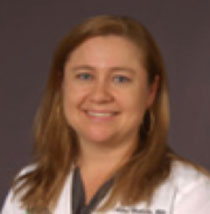About
Born and raised in Greenville, Dr. Hudson received her medical degree from the Medical University of South Carolina in 1997, where she graduated a member of AOA Honor Medical Society. She completed her Pediatric residency with Prisma Health–Upstate, receiving the Jackson Award as an intern and the Miracle Maker Award as a senior resident. Dr. Hudson then served as Chief Resident for the program and joined faculty as Medical Director for Newborn Services in 2000. She was honored with the Matthews Outstanding Faculty Teaching Award in 2005 and in 2014. She served as the Associate Program Director for the Pediatric residency at Prisma Health–Upstatefrom 2006 to 2017. Dr. Hudson’s research interests have included residency curriculum design, breastfeeding and jaundice, newborn vaccination, and neonatal abstinence syndrome. Since 2012, she has had a leadership role within the S.C. Birth Outcomes Initiative and is the principal investigator for a project funded by the S.C. Department of Health and Human Services to implement an innovative treatment model for neonatal opioid withdrawal within other hospitals in SC. Clemson University faculty and associates have partnered with Dr. Hudson since 2013 to analyze, evaluate, and disseminate her model. She’s also an associate professor of pediatrics at the University of South Carolina School of Medicine Greenville.
How their research is transforming health care
Dr. Hudson’s MAiN (Managing Abstinence in Newborns) model is unique in that it combines three innovative approaches in the treatment of term neonates at high risk for opioid withdrawal: rooming-in with mothers in a non-intensive care setting, early pharmacologic treatment (for qualified newborns), and outpatient medication weaning managed by a pediatric medical home. The model has been proven safe, effective, and cost-efficient. As the incidence of opioid use disorders among pregnant women continues to rise, Dr. Hudson’s model has the potential to be a treatment option for a growing number of neonates, a majority of which are currently cared for in neonatal intensive care units. If adopted widely, the model may contribute to decreased transfers to perinatal referral centers, decreased length of stay for newborns dependent on opioids, and decreased healthcare costs for this cohort. Since no formal national guidelines exist for the treatment of neonatal abstinence syndrome, Dr. Hudson’s research will contribute to a critical need for more studies in this area of perinatal medicine.
Health research keywords
Abstinence, Addiction, Birth, Buprenorphine, Maternal, Methadone, Neonatal, Newborn, Opioid, Syndrome, Treatment, Withdrawal

